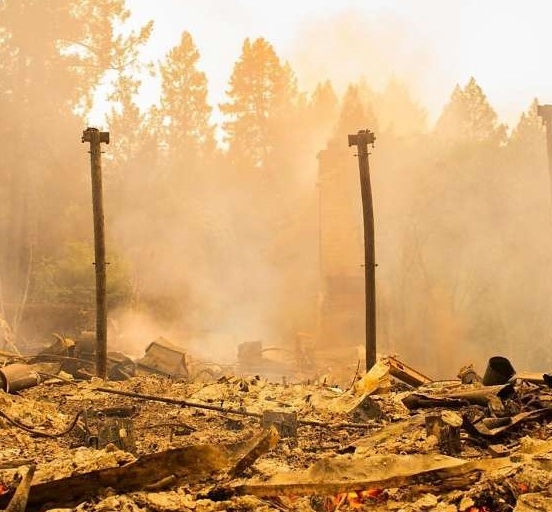Climate, Health and Equity Brief
Fiery destruction, debate chaos and signs of hope
October 2, 2020

The Climate, Health & Equity Brief is GMMB’s take on the week’s news on the current impacts of climate change. If you haven’t subscribed yet, you can do so by clicking here.
Hot Topic: Feeling the heat. Wildfires continue to rage through Northern California’s famed wine country as the region heads into a hot and windy weekend with no relief in sight. As of Friday, more than 66 square miles in Napa, Sonoma and nearby counties have been scorched and 350 structures have burned to the ground, including hundreds of homes and more than 20 historic wineries, restaurants and resorts. The impact on the wine industry has been described as nothing short of “catastrophic.”
A fire of a different kind raged at Tuesday night’s presidential debate. While the result was nearly unwatchable, there was one silver lining: Candidates addressed climate on the debate stage for the first time in 20 years. However, when asked about his belief in climate change and what he plans to do to confront it, Mr. Trump claimed “we now have the lowest carbon” and he wants “crystal clean air and water,” both despite the scores of devastating environmental rollbacks he has implemented since 2016. Just this week, Mr. Trump’s EPA finalized a rule that will ease restrictions on major U.S. polluters by reclassifying them as minor polluters and announced a legal challenge to California Governor Gavin Newsom’s signed executive order to end the sale of gas-powered vehicles in his state by 2035.
In welcome news, New Jersey state legislators have approved a first-in-the-nation ban on single-use plastic and paper bags as well as disposable food containers and cups made of polystyrene foam. The ban is an aggressive step toward eliminating packaging waste and reducing pollution that sets an example for other states to follow. Across the pond, Britain’s National Health Service (NHS) has pledged to become the world’s first carbon-neutral healthcare system by 2040. The NHS’s plans include reducing emissions from its supply chain and existing hospitals, building 40 new zero-emissions hospital buildings and transitioning to an electric ambulance fleet.
Finally, more than 64 world leaders have signed a Leaders’ Pledge for Nature, committing to transitioning their countries to sustainable economic systems, reducing global pollution and ending the dumping of plastics into oceans by 2050. Signatories describe the pledge as a “turning point” by which future generations will judge their willingness to act on environmental destruction. While the pledge is a major step in the right direction to tackle climate change and preserve our biosphere, many of the world’s biggest contributors to global greenhouse gas emissions—including China, India and the U.S.—are notably missing from the list.
—Matt & Traci, GMMB
Health
A record-setting heatwave helped fuel two new major fires in Northern California’s wine country this week, forcing tens of thousands to evacuate and destroying nearly 350 structures, including homes, vineyards, restaurants and resorts. (CNN, The Washington Post)
New research revealed that smoke pollution from this year’s wildfire season in California may have caused up to 3,000 indirect deaths between August and September. (San Francisco Chronicle)
Equity
A new program announced by city officials in Denver, Colorado will invest funds from a recently implemented environmental tax towards creating green spaces in minority neighborhoods. (The New York Times)
An investigation into the Southern California Gas Company revealed that the natural gas utility has been specifically targeting local politicians of color and other minority groups with donations to promote a continued reliance on fossil fuels. (Politico)
Politics & Economy
Twenty years since it was last included as a debate topic, Tuesday’s presidential debate spent nearly 10 minutes on climate change, with Mr. Trump claiming he wants clean air and water despite his hundreds of environmental rollbacks and Joe Biden calling for a green economic transition. (The Guardian, The New York Times)
A newly finalized rule by Mr. Trump’s EPA will reclassify a number of major U.S. polluters as minor ones, allowing them to follow less-stringent restrictions on harmful emissions. (The Hill)
The Trump Administration is moving to legally challenge a recent California executive order to end the sale of gas-powered vehicles by 2035, claiming that the state must obtain EPA approval. (The Hill)
A recent investigation revealed that oil giants BP and Shell continue to back climate-denying lobbying groups despite recently announced commitments to reduce emissions. (Huffington Post)
After struggling to profit from burning coal, U.S. energy company Vistra Corp announced that it will permanently close 12 of its coal plants and shift investments to cheaper renewable energy systems by 2030. (Chicago Tribune)
As climate change is increasingly recognized by voters as a threat to public health, a newly released guide explores the 12 climate questions that all candidates should answer this election season. (Medium, with thanks to Brief subscriber Linda Rudolph, MD, MPH)
Action
A newly launched Leaders’ Pledge for Nature, signed by 64 world leaders, commits to transitioning to sustainable economic systems, reducing global pollution and ending the dumping of plastics into oceans by 2050. (The Guardian)
In a first-in-the-nation commitment to combat packaging waste in the U.S., New Jersey’s state legislature has voted to ban single-use plastic and paper bags as well as disposable food containers and cups made of polystyrene foam. (The New York Times)
Britain’s National Health Service has pledged to become the first carbon-neutral healthcare system in the world by 2040, with plans to reduce hospital and supply chain emissions and transition to an electric ambulance fleet. (Reuters)
Following sustained pressure from its student body, Cambridge University will divest $4.5 billion from fossil fuels and redirect investments to renewable energy by 2025. (Bloomberg)
California Governor Gavin Newsom has announced a new Climate Action Corps that will help execute sustainability and climate resilience projects across the state. (The Atlantic)
Kicker
Just when we need something to smile about…it’s Fat Bear Week! Watch the bears in Alaska’s Katmai National Park in action and cast your vote each day for the fattest bear to help choose this year’s champion.
“If we don’t take climate action, the collapse of our civilizations and the extinction of much of the natural world is on the horizon.”
– Sir David Attenborough






